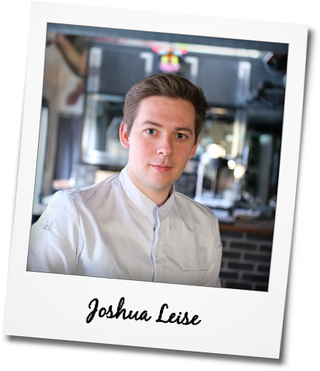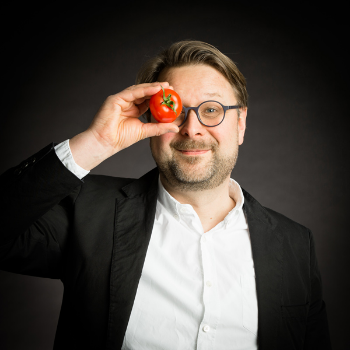

PMM: Mr. Leise, you just surprised your guests with vegan cuisine. As a starred chef, how did you come to do this?
Joshua Leise: I think the time is ripe for it and the demand is there. Until now, we always had a "normal" menu and a vegetarian menu based on it on the menu. Now we offer two completely different menus, where nothing overlaps, at most in the products, but not in the components or in the preparation method.
How much do the menus cost?
We offer the vegan 7-course menu for 155 euros, the same price as the normal 6-course menu without caviar course.
As a star chef, can you actually do without lobster, turbot or bresse chicken?
Yes, absolutely, it's a nice challenge. But that's exactly what makes our cuisine unique. It lives from the fact that we do without exactly these products, because you can get them everywhere in the world, usually even prepared in a similar way. We have other great products, but you have to find them first. But then it's a lot of fun to show the guests what you can get out of a whitefish, for example. Many people don't eat this fish very often, and I think it's exciting to create a surprise effect with it. If you've never tried a whitefish before and you like the dish, you'll remember it.
Where do the products come from, what criteria do you use to select suppliers?
The exchange with suppliers is very important. They must have a desire to work closely with us. Then it's nice to plan ahead together or have something specific prepared for us. In January, we sat down with a farmer and made a plan for the whole year, so he knows what needs to be produced for us and when, and in what quantities. Otherwise, of course, the main criterion is quality. We always compare: where is the trout better, from the lake or from a farm?
What role does zero-kilometer cuisine play?
We don't focus completely on that, but what goes on the plate should reflect what the region has to offer. However, we don't draw a line by saying the closer the better. It may well be that we find a higher-quality product 20 kilometers away.
Do you travel a lot yourself?
Yes, we do, both with the producers we work with and with new partners.
What are the best sellers on the menu?
We change the menu regularly. Not all courses at once, but after eight weeks everything is changed. There is no dish twice, but with the products there are repeat offenders. Arctic char is one of them, because it's very easy to source over a long period of the year. I love this fish. In the winter, we usually have pikeperch as well. I like to work with freshwater fish - it sets the tone, because not many do that. At whitefish season, we have whitefish. We have almost more fish dishes than meat dishes on the menu. In the summer, we also bring more vegetarian components back into the "normal" menu. But there is no signature dish that always has to stay on the menu.
Strawberries in winter...
No. Only those that we put in the summer itself.
Aha, the jar definitely plays a role...
In winter, the range of products is not so large, then it is advantageous to have some pickled in the summer. Strawberries, for example, or eggplant, tomatoes and peppers.
Let's get back to plant-based cuisine. Is it just a trend?
We can already tell that it's more than just a trend. More and more people are thinking sustainably and want to eat a plant-based diet. I can't imagine that this will disappear again. We at least plan to continue with vegan menus for the next few years.
In December, the Mural surprised with an 89-euro "Wumms" menu. A vegan menu will follow. Are there already new ideas?
Yes, a Flower Power menu as part of the Flower Power Festival in Munich. Four dates from March onwards have already been fixed, at which we will offer a flower menu and also a guided tour of the Muca Museum, where we are accommodated. But what I also really enjoy are winemaker evenings or wine dinners, where we cook to match the wine and not the other way around - that is, when the wine is chosen to go with the food. With this concept, the wines are fixed and we come up with a dish to go with them. This is very well received. And it stimulates creativity in a different way.
Where else does inspiration come from?
Often from the producers and from the products themselves. In our kitchen, the product should arrive on the plate as unadulterated as possible. So the question is, how do I prepare it so that it tastes like what it is? Or else, how can the flavor be intensified without being masked by another ingredient? It also happens that a farmer raises a certain type of vegetable and asks me if I can do something with it. Inspiration can really come from the snack stand or directly from the field. For example, we once had a köfte sandwich on the menu, but with kid meat from a small farmer in the region.
How cheap can you cook as a star chef? Is there possibly also a student menu for 69 euros?
I think with 89 euros we have now already reached the limit of what can be calculated. At this price, of course, no caviar can be offered. But you can't just consider the product costs, you also have to take into account staff salaries and running costs. With the 89-euro menu, we asked ourselves exactly how far we could go without making a loss. Nevertheless, we also wanted to make an offer to those guests who would like a 4-course menu but can't afford it any other way. This is feasible if you do without certain luxury products. A trout is not very expensive, but it is a super fish and you can get a lot out of it. Therefore, there is the trout rather than the smoked eel, which costs five times as much.
Do you continue to offer the 4-course whammy menu?
Yes, there is no end planned for now... Always Tuesday to Thursday, but limited to ten seats in the evening.
After the vegan menu comes the Flower Power menu. What exactly is in it?
This menu was created in collaboration with the Muca Museum. This is another little surprise. We have created a 4-course menu including apero, wine accompaniment and amues bouches... The complete package for 230 euros also includes a guided tour of the museum with Steffi Utz, the owner. Four dates are already fixed in the context of this Munich festival, starting in March, one day each month.
We are very excited and thank you for the interview.

Joshua Leise (born 1995) is a Munich native through and through. The chef at Mural loves Bavaria and says, "First of all, nothing pulls me away, I have everything here." After graduating from high school in 2014, he first went up north and completed an apprenticeship at Söl'ring Hof on Sylt (until 2017) with Johannes King and Jan-Philipp Berner. Then the return journey to the Munich studio of Jan Hartwig (until 2018). After this stopover, Leise finally joined Mural as head chef in September 2018. The awards followed blow after blow: since 2020 a Michelin star (at that time with 24 years the youngest star chef in Germany), 2020 at the same time Young Chef Award from the Guide Michelin as well as award Young Talent Gault Millau.
We provide you with fresh industry news and informative interviews - just enter your name and e-mail address and click "Subscribe"!
